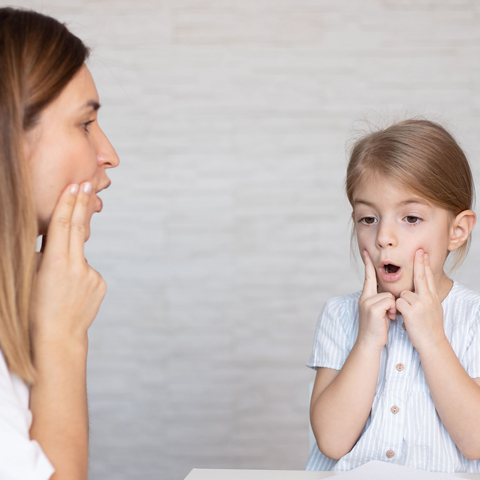Why Study Speech-Language Pathology
The Master of Speech-Language Pathology (MSLP) program at Austin Peay State University (APSU) offers an inspiring and transformative educational experience for those passionate about making a difference in the lives of individuals with communication and swallowing disorders. As an APSU MSLP student, you will develop the skills to assess, diagnose, and treat individuals across the lifespan, preparing you for a rewarding career in this important healthcare field.
Our comprehensive, full-time program is designed to be completed in just five semesters—two fall, two spring, and one summer. The first year focuses on building foundational knowledge and clinical skills through hands-on experiences in the on-campus APSU Speech-Language and Swallowing Community Clinic. The second year immerses students in external placements, where they gain real-world experience across diverse practice settings. This blend of face-to-face and online instruction ensures flexibility while maintaining a high standard of learning.
At APSU, we are committed to providing a curriculum that integrates clinical education with evidence-based, client-centered care. Talented faculty with doctoral and master’s degrees bring extensive clinical expertise and a passion for teaching, ensuring that students receive personalized mentorship and guidance. Our program’s unique features include specialty training in pediatric and adult feeding and swallowing disorders, including hands-on experience with endoscopy procedures. Additionally, students have opportunities to engage in faculty-mentored research projects, further enriching their graduate education.
Graduates of the APSU MSLP program are well-prepared to excel in a variety of professional settings and will be eligible to apply for the Certificate of Clinical Competence from the American Speech-Language-Hearing Association (ASHA) upon meeting all certification requirements. They may also qualify for state licensure in Tennessee and Kentucky as well as the Professional School Service Personnel License from the State of Tennessee’s Department of Education.
The Master of Speech-Language Pathology (MSLP) residential education program in speech-language pathology at Austin Peay State University is a Candidate for Accreditation by the Council on Academic Accreditation in Audiology and Speech-Language Pathology (CAA) of the American Speech-Language-Hearing Association, 2200 Research Boulevard, #310, Rockville, MD 20850, 800-498-2071 or 301-296-5700. Candidacy is a “preaccreditation” status with the CAA, awarded to developing or emerging programs for a maximum period of 5 years.
Speech-Language Pathology is more than a major; it’s a calling for those who value personal interaction and are driven to help individuals improve their quality of life. At APSU, you will gain the knowledge, skills, and experience needed to make a lasting impact in the lives of others. Begin your journey with us and become part of a program dedicated to shaping the future of Speech-Language Pathology.
Admission Requirements
For information related to admission requirements please visit the graduate bulletin.
What will I Learn
- Explain the nature of typical and disordered communication and swallowing across the lifespan.
- Develop evidence-based diagnostic and intervention plans in a variety of settings and for individuals with a variety of communication and swallowing disorders at a level appropriate for entry into professional practice.
- Choose a course of action to address an ethical dilemma associated with clinical practice that complies with the SLP Scope of Practice.
- Justify clinical decision making based on interpretation of research findings in the context of other relevant sources.
- Discuss professional issues that affect speech-language pathology.
- SUmmarize processes and requirements for professional credentials required for professional practice of speech-language pathology for carious locations and practice settings.
- Use effective communication skills, recognize the needs, values, preferred mode of communication and cultural/linguistic background of client, family, caregivers and relevant others.
- Implement evidence-based diagnostic and intervention plans in a variety of settings and for individuals with a variety of communication and swallowing disorders at a level appropriate for entry into professional practice.
